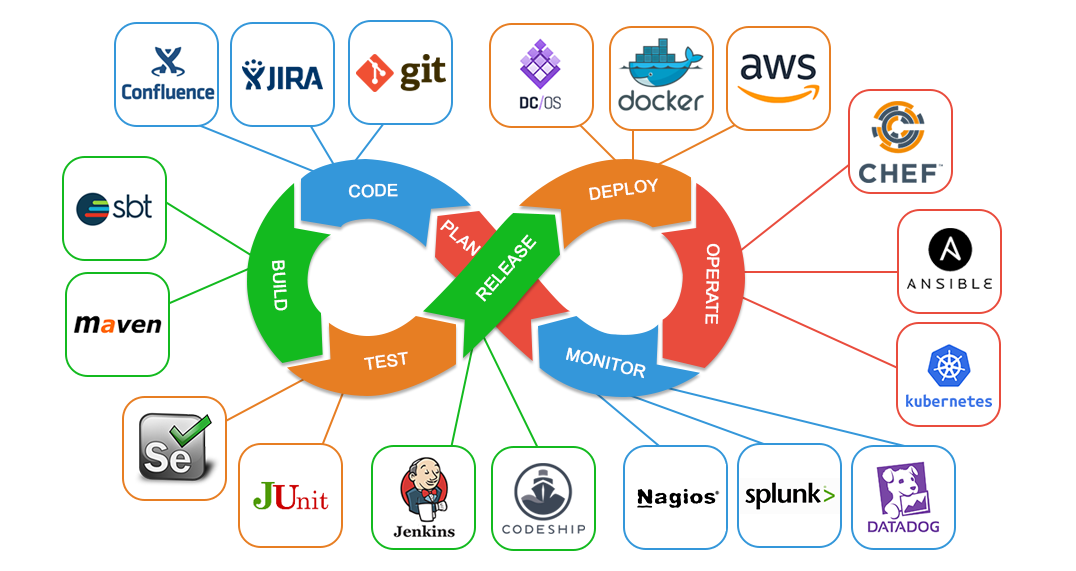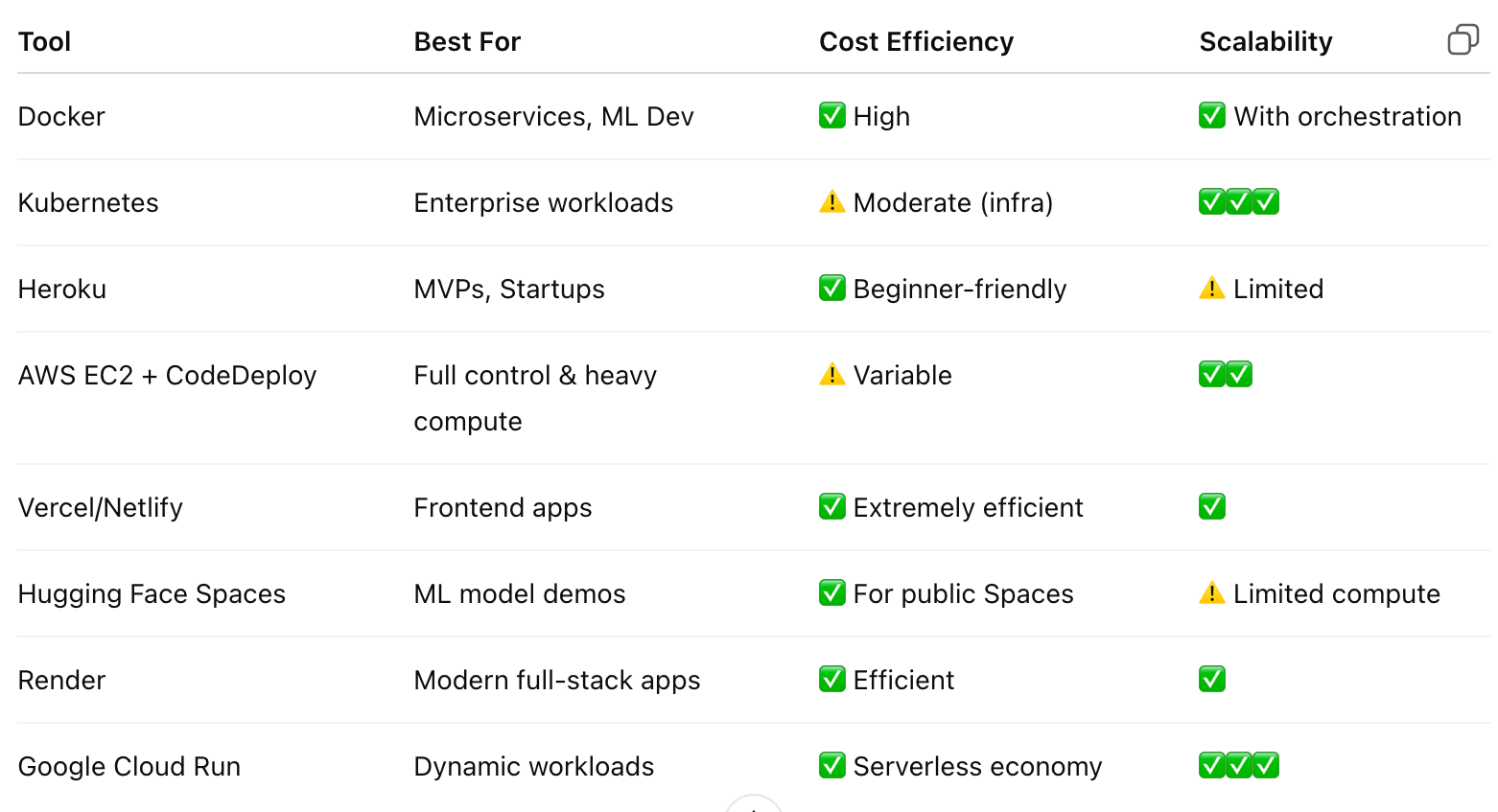🚀 Mastering Deployment: Top Tools You Must Know Before Launching Your App or Model!
🚀 Mastering Deployment: Top Tools You Must Know Before Launching Your App or Model!
In the fast-paced world of development, building an application or AI model is only half the journey — the real magic happens when you deploy it! 🎯 Whether you’re launching a web app, microservice, or a machine learning model, choosing the right deployment tool is crucial for efficiency, scalability, and cost savings. 💡
Let’s explore the top deployment tools, their unique features, real-world use cases, costs, and best-fit scenarios! 🔧💰

1️⃣ Docker 🐳 — Containerization King
“Build once, run anywhere.”
🔹 Features:
- Packages your app and its environment into a lightweight container.
- Ensures consistency across development → staging → production.
- Great for microservices architecture.
- Easy to scale and move across platforms (cloud, on-premise, etc.).
✅ Best For:
- Web applications, APIs, microservices.
- Environments with different system dependencies.
💸 Cost:
- Free for individuals.
- Docker Pro: ~$5/month, Business plans for teams.
📦 Example:
Deploy a Flask ML model wrapped in a Docker container for seamless CI/CD integration.
2️⃣ Kubernetes (K8s) ☸️ — The Orchestrator
“Manage thousands of containers like a breeze.”
🔹 Features:
- Automates deployment, scaling, and management of containerized apps.
- Self-healing, load balancing, auto-rollouts/rollbacks.
- Highly configurable and cloud-agnostic.
✅ Best For:
- Large-scale production systems, ML model clusters, SaaS products.
💸 Cost:
- Open-source, but infra and managed K8s services (GKE, EKS, AKS) add cost.
🌍 Example:
Running a high-load AI recommendation system deployed via Kubernetes on Google Cloud (GKE).
3️⃣ Heroku 🌈 — Developer’s Delight
“Focus on code, not servers.”
🔹 Features:
- PaaS (Platform as a Service), simple Git-based deployments.
- Supports many languages: Ruby, Python, Node.js, Java.
- Add-ons for databases, caching, logs, etc.
✅ Best For:
- Startups, MVPs, and personal projects.
💸 Cost:
- Free tier available, paid plans from ~$7/month/app.
🚀 Example:
Deploy your first Rails or Django app with a single command:
git push heroku main4️⃣ AWS EC2 + CodeDeploy 🌐 — Infrastructure Powerhouse
“Build custom deployments with full control.”
🔹 Features:
- Launch virtual machines (EC2) with your custom app.
- Use AWS CodeDeploy for seamless rollouts and CI/CD.
- Highly scalable, integrates with S3, Lambda, CloudWatch.
✅ Best For:
- Enterprise-grade apps needing custom configurations.
- Backend-heavy workloads, ML inference models.
💸 Cost:
- Pay-as-you-go model. Free tier available for EC2 (750 hrs/month for 12 months).
⚙️ Example:
Deploy a deep learning model on an EC2 GPU instance with auto-scaling using CodeDeploy.
5️⃣ Vercel & Netlify 🌐 — JAMStack Heroes
“Frontend first? These are your weapons.”
🔹 Features:
- Zero-config deployment for React, Vue, Svelte, static sites.
- Global CDN, Git integration, rollbacks, preview URLs.
- Functions-as-a-service for backend logic.
✅ Best For:
- Frontend apps, static sites, blogs, portfolios.
💸 Cost:
- Free tiers; Pro plans ~$20/month.
💡 Example:
Deploy a Next.js blog with serverless APIs using Vercel in under 1 minute.
6️⃣ Hugging Face Spaces 🤖 — ML Model Showcase
“Deploy your ML models with a beautiful UI — instantly.”
🔹 Features:
- Direct integration with Gradio or Streamlit UIs.
- Deploy PyTorch, TensorFlow, or Transformers-based models.
- Community sharing + version control.
✅ Best For:
- ML model demos, prototyping, academic projects.
💸 Cost:
- Free public Spaces; Pro starts from ~$9/month.
📊 Example:
Deploy a sentiment analysis model using Gradio on a Hugging Face Space.
7️⃣ Render 🔄 — Modern Cloud Alternative
“All-in-one cloud platform with simple pricing.”
🔹 Features:
- Supports Docker, static sites, APIs, background workers.
- Auto HTTPS, pull-based deployments.
- PostgreSQL, Redis support.
✅ Best For:
- MVPs, SaaS, side projects.
💸 Cost:
- Generous free tier; paid plans from ~$7/month.
⚡ Example:
Deploy a background job worker for your Ruby on Rails app without DevOps headaches.
8️⃣ Google Cloud Run ☁️ — Serverless Magic
“Scale from zero to millions — serverlessly.”
🔹 Features:
- Deploy containers that scale automatically with request volume.
- Pay-per-use pricing model.
- Integrated with Google Cloud services.
✅ Best For:
- Containerized webhooks, APIs, ML models with variable load.
💸 Cost:
- Free tier includes 2 million requests/month. Pay-per-second billing after.
🧪 Example:
Deploy a text summarization ML model container via Cloud Run and trigger with HTTP requests.
🎯 Choosing the Right Deployment Tool

🔚 Final Thoughts: Launch Like a Pro! 🚀
Your product is only as impactful as its deployment experience. Choose tools that:
- Match your app architecture
- Suit your budget
- Support team collaboration
- Enable future scaling
🔧 Whether you’re a solo developer building the next big SaaS, or a data scientist sharing your ML model with the world — choose wisely, deploy smartly. 💡
💬 Have a favorite tool or story to share? Drop it in the comments or tag me!
Let’s make deployment simple, smart, and successful. 💪✨
Comments
Post a Comment